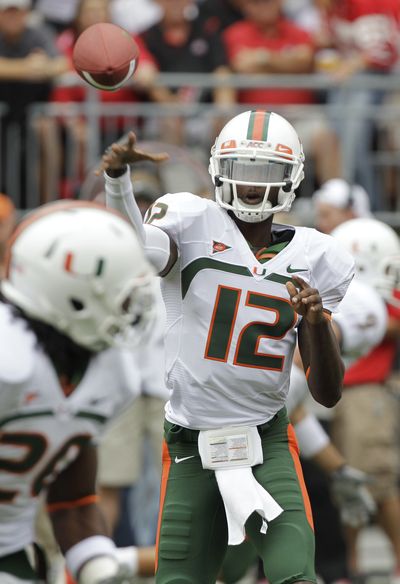Hurricanes players can no longer tweet

College football: Miami’s football players just got a direct message: No more Twitter.
The 17th-ranked Hurricanes have been told to stop using accounts on the popular social network, the university’s athletic department said Tuesday – making the announcement, yes, through its own Twitter feed.
Miami coach Randy Shannon was recruiting and unavailable for comment. Unlike many coaches, Shannon has not become part of the Twitter craze, saying earlier this year that he was “too old-school” to get involved with the phenomenon where people may share information in “tweets,” or messages limited to 140 characters.
More than 300,000 people sign up for a Twitter account every day.
“Football program has asked players to shut down Twitter accounts. Goal is to limit distractions & focus,” was the statement posted on the athletic department’s account, @hurricanesports.
It’s unclear when the edict was issued.
Several of Miami’s top players have been prolific posters on Twitter, including quarterback Jacory Harris, defensive tackle Marcus Forston and defensive back DeMarcus Van Dyke. It’s unknown how many players had accounts.
Miami isn’t the first team to put a Twitter ban in place.
Perhaps most notably, No. 3 Boise State was told by coach Chris Petersen this summer that players were not permitted to use the social site, also in an effort to limit distractions.
“It’s just a distraction that we just don’t really need to have right now. There’s plenty of time in their lifetime for Twitter,” Petersen told the Idaho Statesman last month.
• Pitt’s Romeus to have surgery: Pittsburgh Panthers defensive end Greg Romeus will have surgery Thursday to repair a disk in his lower back and will miss an undetermined number of games.
The Big East co-defensive player of the year last season is expected to play again this season, though it is unclear when.
Romeus had 11 1/2 tackles for loss, eight sacks, three forced fumbles, an interception and a fumble recovery last season as a junior. He was a finalist for the Ted Hendricks award as the defensive end of the year.
Toronto fires Hall of Fame coach
Soccer: Major League Soccer’s Toronto FC fired coach Preki Radosavljevic and director of soccer Mo Johnston.
Toronto is third in the East at 7-10-7 and appears likely to miss the playoffs following Saturday’s 1-0 home loss to D.C. United, which has the poorest record in the league.
Preki, inducted last month into the U.S. Soccer Hall of Fame, was in his first season with Toronto after earning coach of the year honors at Chivas USA. Johnson had been with the team since its inception, and Toronto has never made the playoffs.
Assistant coach Nick Dasovic was named interim head coach. Earl Cochrane, manager of team operations, took over on an interim basis for Johnston.
• Saprissa quiets Sounders: David Guzman and Allan Aleman scored to lead the Costa Rican club Saprissa to a 2-0 victory over the Seattle Sounders in a Group C game in the CONCACAF Champions League at San Jose, Costa Rica.
After three matches, Saprissa has six points while Seattle has lost all three of its games in Group C.
• Regular-season schedule expanded: Major League Soccer is expanding its regular-season schedule from 30 to 34 games next season following the addition of expansion teams in Portland and Vancouver, British Columbia.
The season will start March 19 and end Oct. 22.
• Bogus team represents Togo in match: The chairman of Togo’s soccer federation says the team that lost an exhibition game 3-0 to Bahrain last week claiming to be the Togo national team was “completely fake.”
Seiyi Memene told the Associated Press “we have not sent any footballers to Bahrain. The players that took part in the friendly match against Bahrain were completely fake.”
Ex-German official knew of doping
Olympics: A former East German sports official has reportedly acknowledged there was widespread state-sponsored doping in the communist country, including of minors.
Thomas Koehler, an East Germany sports official in the 1970s and ’80s, made the admission in his book “Two Sides of the Medal,” which was obtained by German news agency DPA before publication this week.
“The sports leadership decided to use selected anabolic substances in a series of sports (in the 1970s),” Koehler wrote.
Koehler claimed that “all substances were administered in agreement with the athletes,” DPA reported.